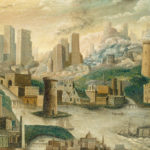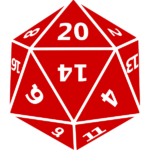Random Fantasy City Magical Feature Generator

Wanting to add magical elements to the cities to my high fantasy Dungeons & Dragons campaign, since it’s difficult to just think of elements out of the blue, I came up with this list as an idea generator. Here’s how it works:
- Choose how many features to include. This will be determined by the level of magic in your world. For my high fantasy world, you can use the Number of Features formula below.
- Roll D100 on the Feature Type table. That will tell you which table of features to roll on.
- Roll on the corresponding Feature table (Natural, Man-made, or Supernatural)
- Then, roll D100 on the Phenomenon table to determine the type of phenomenon.
- If it tells you to roll again, combining, roll on the same table unless otherwise instructed, and figure out how to combine the two items.
- Use your imagination to combine feature & phenomenon to determine what fits best in your campaign world. Don’t forget the history of the feature and how it has affected the city and its residents.
Number of Features
For every 1000 people in a city, roll 1D6. Every 6 indicates one magical feature. (This can also be used for rural regions, but I suggest 1D6 for every 3000-5000, but note that the feature may be hidden and unknown to the populace, and the party could travel through the region and never know it’s there.)
Feature Type (D100)
01-35 Natural
36-80 Man-Made
81-95 Supernatural
96-00 Roll twice, combining
Feature
Natural (2D20)
- Stream
- Hill
- Falls
- Valley
- Tree
- Grove
- Sky
- Large stone / Obelisk
- Grass
- Weed/wildflower
- Dirt
- Cave
- Pond
- Mud/lava/geyser/tar
- Weather
- Vines
- Pit/chasm
- Footprint(s)
- Nest/Den
- Rock formation
- Dam
- Crater
- Ridge
- Orchard
- Dry bed (river/lake)
- Local flora
- Local fauna
- Spring
- Chain of ponds/lakes
- Underground tunnel network
- Local fungus
- Fossils
- Woods
- Dead Flora
- Dead Fauna
- A formerly prevalent local creature
- A plot of land
- Roll again, combining
- Roll again, 1 Man-Made & Roll again on Feature Type Table
Man-Made Feature (2D20)
- Shop Cart
- One building
- Wall
- Arboretum
- Garden
- Hanging garden
- Well
- District
- Road
- Sewer
- Monument
- Cemetery
- Field
- Dock
- Farm
- Mine
- Quarry
- Fountain
- Entire City
- Military/guard
- Dump/Junkyard
- Bridge
- Altar/shrine
- Aqueduct
- Zoo
- Statue/sculpture
- Museum
- Crossing
- Dam
- Path/trail
- Park
- A city block
- Tent
- Gazebo
- Every one of a certain kind of building in town
- The marketplace
- Dungeon
- Roll again, combining
- Roll again, 1 Man-Made & Roll again on Feature Type Table
Supernatural Feature (2D8)
- Meteor
- Portal
- Magical technology
- Undead
- Light
- Darkness
- A paired location (2 places magically connected)
- Magical inscription / circle
- Spacial / Dimensional anomaly
- Laboratory
- Ancient magical site
- Crash site
- Magical juncture
- Site of magical event with residual effects
- Supernatural Being
Phenomenon (D100)
- Has layers
- Glows
- Defies physics
- Wards off something
- Is higher than expected
- Is lower than expected
- Is in an odd part of town
- Is a source of conflict
- Is carnivorous
- The city depends on it
- Oppresses someone
- Associated with a curse
- Houses a special species
- Houses a celebrity
- Is ruins
- Burns
- Is wetter than expected
- Offers a unique resource
- Is built in the shape of something
- Roll twice
- Floats
- Is a location of a sport or game
- Is bigger on the inside
- Is the location of a tragedy
- Is a hive-like network
- Is a center of criminal activity
- Is not what it seems
- Is an unexpected color
- Has an unexpected odor
- Has an unexpected sound / music
- Is believed to be haunted
- Is shrouded in fog
- Splits the city
- Is an unexpected shape
- Is associated with a specific creature
- Is unexpectedly lacking/missing
- Is a source of transportation
- Is much larger than expected
- Is much smaller than expected
- Is a canopy
- Is an unexpected temperature
- Is difficult to access
- Is domed
- Is much more numerous than expected
- Disappears
- Is a source of knowledge
- Is alive/animate
- Explodes
- Has unique walls
- Is unexpectedly indoors/outdoors
- Transforms something
- Is made from a carcass/skeleton/shell/Carapace
- Inhibits some magic
- Augments some magic
- Is a holy site
- Used to be something else
- Is carved out of something
- Is guarded
- Is an impossible shape
- Has different gravity
- Is made of an unexpected material
- Is slowly being destroyed
- Is sideways or upside-down
- Has smaller parts coming from it
- Is crystalline
- Changes into something else
- Is longer than expected
- Is impassable
- Is unexpectedly flat
- Is burned
- Previously housed something else (hive, web, etc.)
- Is toxic
- Is held up by something
- Is associated with another plane (outer or inner)
- Is full of something
- Is frozen or petrified
- Is in something unexpected
- Is under something
- Is aware
- Is clockwork
- Is hollow
- Wild magic
- Unexpectedly controlled / uncontrolled
- Associated with a unique magical material
- Moves
- Corrosive
- Controls minds/emotions
- Mimics a spell
- Drains something
- Is invisible
- Changes size
- Something will come/hatch/spawn from it
- Affects one or more senses
- Causes disappearances
- Is unexpectedly tough
- Is unexpectedly vulnerable
- Is a location of a valuable resource
- Most people don’t know it’s there
- Is a treasured landmark
- Roll twice, combining
